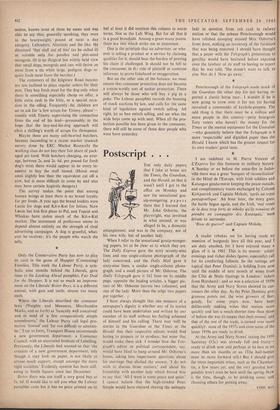Postscript . • •
When I refer to the sensational gossip-monger- ing papers, let us be clear as to which they are. The Daily Express gave the story seventy-nine lines and one single-column photograph of the lady concerned, and the Daily Mail gave it sixty-nine lines, a similar single-column photo- graph, and a small picture of Mr. Osborne. The Daily Telegraph gave it 162 lines on its middle page, opposite the leading articles, a bigger pic- ture of Mr. Osborne (across two columns), and one of the lady. More than the oth9r two papers put together.
I have always thought that one measure of a newspaper's dignity is whether any of its stories could have been undertaken and written by any member of its staff without his feeling ashamed of himself and his calling. There may well be stories in the Guardian or the Times or the Herald that their respective editors would find boring to prepare or to produce, but none that would make them sick. I wonder how the Tele- graph's editor or political correspondent, say, would have liked to hang around Mr. Osborne's house, asking him impertinent questions about his marriage that elicited the answer, 'I do not wish to discuss those matters,' and about his friendship with another lady which forced him to say that, 'All I want is some peace and quiet.' 1 cannot believe that the high-minded Peter Simple would have enjoyed chasing the unhappy lady in question from cab rank to railway station or that the urbane Peterborough would have relished snooping around Mrs. Osborne's front door, making an inventory of the furniture that was being removed. 1 should have thought that a paper with the Telegraph's pretensions to gentility would have hesitated before exposing even the lowliest of its staff to having to report that he was told, 'She doesn't want to talk to you. Nor do I. Now go away.'
Peterborough of the Telegraph made mock of the Guardian the other day for not having re- ported a classic horse race: I wonder if he is now going to crow over it for not yet having recruited a commando of keyhole-peepers. The odd thing is that there must be a million and more people in this country—petty bourgeois Tory voters who haven't the money for the Times or the mental equipment for the Guardian —who genuinely believe that the Telegraph is a more 'respectable' and dignified paper than the Herald. I know which has the greater respect for its own readers' good taste.
I am indebted to M. Pierre Vincent of L'Express for this footnote to military history. A Sunday or so before the cease-fire in Jadot- ville there was a great 'banquet of reconciliation' in the HOtel de l'Europe, with Irish soldiers and Katangan gendarmerie keeping the peace outside, and complimentary toasts exchanged by Colonel Kirkpatrick and Captain Mokele, 'aptis un repas pantagruelique.' An hour later, the story goes, the battle began again, and the Irish, 'mai remis de la dose trop forte de whisky qu'ils venaient de prendre en compagnie des Katangais.' were driven to surrender.
'Ruse de guerre!' said Captain Mokele.
A reader rebukes me for having made no mention of burgundy here all this year, and I am duly abashed, for I have enjoyed many a glass of it in 1961. This is its season: colder evenings and richer dishes (game, especially) call for its comforting fullness. So the tastings are topical that Peter Dominic is holding from noW until the middle of next month of wines from the Cote de Nuits (tastings in London: tickets from Horsham): and so was a selection of 19599 1 that the Army and Navy Stores showed its cus- tomers the other day. As the Peter Dominic pro- gramme points out, the wine growers of Bur- gundy, for some years now, have been deliberately making wines that mature more quickly and last a much shorter time than those of before the war (it means that their money, and that of the rest of the trade, is turned over more quickly): most of the 1957s and even some of the lesser 1959s are ready to drink.
At the Army and Navy Stores' tasting the 1959 Santenay (12s.) was already full and fruity— ready to drink now and perhaps at its best in no more than six months or so. (The half-bottles must be more forward still.) But I should give the more important wines, such as the Chamber tin, a few years yet, and the very, greatest bur- gundies won't even be here until the spring. Now is the time, though, to be drinking some, and choosing others for putting away.
CYltIL RAY






































 Previous page
Previous page